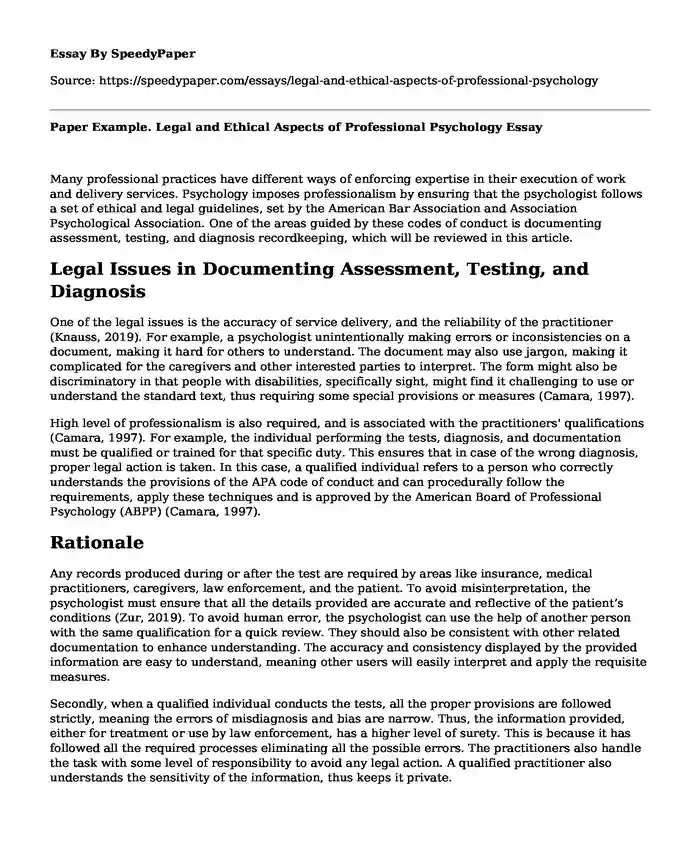
| Type of paper: | Essay |
| Categories: | Psychology Law Medicine Ethical dilemma |
| Pages: | 3 |
| Wordcount: | 574 words |
Many professional practices have different ways of enforcing expertise in their execution of work and delivery services. Psychology imposes professionalism by ensuring that the psychologist follows a set of ethical and legal guidelines, set by the American Bar Association and Association Psychological Association. One of the areas guided by these codes of conduct is documenting assessment, testing, and diagnosis recordkeeping, which will be reviewed in this article.
Legal Issues in Documenting Assessment, Testing, and Diagnosis
One of the legal issues is the accuracy of service delivery, and the reliability of the practitioner (Knauss, 2019). For example, a psychologist unintentionally making errors or inconsistencies on a document, making it hard for others to understand. The document may also use jargon, making it complicated for the caregivers and other interested parties to interpret. The form might also be discriminatory in that people with disabilities, specifically sight, might find it challenging to use or understand the standard text, thus requiring some special provisions or measures (Camara, 1997).
High level of professionalism is also required, and is associated with the practitioners' qualifications (Camara, 1997). For example, the individual performing the tests, diagnosis, and documentation must be qualified or trained for that specific duty. This ensures that in case of the wrong diagnosis, proper legal action is taken. In this case, a qualified individual refers to a person who correctly understands the provisions of the APA code of conduct and can procedurally follow the requirements, apply these techniques and is approved by the American Board of Professional Psychology (ABPP) (Camara, 1997).
Rationale
Any records produced during or after the test are required by areas like insurance, medical practitioners, caregivers, law enforcement, and the patient. To avoid misinterpretation, the psychologist must ensure that all the details provided are accurate and reflective of the patient’s conditions (Zur, 2019). To avoid human error, the psychologist can use the help of another person with the same qualification for a quick review. They should also be consistent with other related documentation to enhance understanding. The accuracy and consistency displayed by the provided information are easy to understand, meaning other users will easily interpret and apply the requisite measures.
Secondly, when a qualified individual conducts the tests, all the proper provisions are followed strictly, meaning the errors of misdiagnosis and bias are narrow. Thus, the information provided, either for treatment or use by law enforcement, has a higher level of surety. This is because it has followed all the required processes eliminating all the possible errors. The practitioners also handle the task with some level of responsibility to avoid any legal action. A qualified practitioner also understands the sensitivity of the information, thus keeps it private.
Conclusion
All professions are guided by a code of ethics usually set by a legally recognized institution articulating how individuals should act. One of the areas that is guided by these principles in psychology is recordkeeping. The information needs to be accurate, without bias, and only from a qualified person. This is because such information has uses in other sensitive areas like treatment, criminal investigation, and prosecution.
Reference
Camara, W. J. (1997). Use and Consequences of Assessments in the USA: Professional, Ethical and Legal Issues. European Journal of Psychological Assessment, 13(2), 140–152. https://doi.org/10.1027/1015-5759.13.2.140
Knauss, L., K. (2019, December 1). Ethical and Professional Issues in Assessment. The Cambridge Handbook of Clinical Assessment and Diagnosis. https://www.cambridge.org/core/books/cambridge-handbook-of-clinical-assessment-and-diagnosis/ethical-and-professional-issues-in-assessment/8262069C02C8C84D2D56F2BF55200378
Zur, O. (2019, January 29). Ethics Codes On Record-Keeping and Informed Consent In Psychotherapy and Counseling. Zur Institute. https://www.zurinstitute.com/ethics-of-recordkeeping/
Cite this page
Paper Example. Legal and Ethical Aspects of Professional Psychology. (2023, Aug 01). Retrieved from https://speedypaper.net/essays/legal-and-ethical-aspects-of-professional-psychology
Request Removal
If you are the original author of this essay and no longer wish to have it published on the SpeedyPaper website, please click below to request its removal:
- Healthcare Essay Sample for Everyone
- Essay Sample on Trends in Biomedical Engineering
- Free Essay. Psychiatric and Mental Health Nurse Practitioner in Georgia
- Paper Example. Common Laws and Penalties
- Paper Example. Non-Communicable Diseases (NCDs)
- Essay Sample on Health Assessment and Teaching Plan in Navajo Community
- Northwell Health: Delivering Quality Health Solutions for All - Essay Sample
Popular categories




